-
Genealogy & Names
-
Tourist Information
-
Culture & Reference
VALENTINES GIFTS FROM IRELAND - VISIT IrishNation.com Only 36 Days To Go! |
|
Oct 2023 
Hill of Tlachtga Image from Free Photos Of Ireland |


FREE WORLDWIDE DELIVERY FOR A LIMITED TIME find out more |

| Popular Articles from Recent Newsletters: |


|
The 2022 Census results continue to provide fascinating and occasionally surprising information about the state of the Irish Nation. 
Immigration into Ireland is a relatively recent phenomenon with the 2022 numbers revealing that there were 632,000 non-Irish citizens living in Ireland at the time of April 2022 Census. This represents 12% of the population although these numbers have changed fairly dramatically in the wake of the war in The Ukraine. Recent data from the Central Statistics Office (CSO) of Ireland show that since the war began just over 96,000 Ukrainians arrived into Ireland under the 'Temporary Protection Directive'. Nearly 77% of people identified their own ethnic group or background as 'White Irish', followed by 'Any Other White background' at 10%, Indian/Pakistani/Bangladeshi at 2%, and Black or Black Irish at 1%. From a Religion perspective 69% indicated their religion as Roman Catholic (a drop of 3.4% since the 2016 census), 14% as having no Religion (a 63% increase), 2.3% were Protestant (Church of Ireland, etc.), and just over 1.8% were Orthodox Christian, 1.53% were Moslem, with 0.6% Hindu. CSO sources: https://www.cso.ie/en/statistics/population/censusofpopulation2022/ https://www.cso.ie/en/releasesandpublications/fp/p-aui/arrivalsfromukraineinirelandseries11/  The housing crisis in Ireland continues to frustrate and amaze with the news that property prices have again risen in 2023 by as much as 0.9%, a fall compared to the increase of 1.6% to July 2022. The important fact here is that prices are still rising! And this is despite successive Governments promising that the situation will eventually improve.
The housing crisis in Ireland continues to frustrate and amaze with the news that property prices have again risen in 2023 by as much as 0.9%, a fall compared to the increase of 1.6% to July 2022. The important fact here is that prices are still rising! And this is despite successive Governments promising that the situation will eventually improve.
Of course the massive influx of refugees from the war in The Ukraine has certainly impacted the property market. But the fact remains that a huge number of these refugees fleeing the violence are accommodated in hotels or buildings leased by the Government, or in private citizens homes, or even in tents dotted around the Irish landscape. The knock-on effect is that private rental accommodation is harder and harder to find, making it more difficult for people to access jobs in the larger urban centres (especially Dublin). Thus the housing crisis/disaster is causing a shortage of Teachers and Nurses and Surveyors and Accountants and Builders and (insert job-type here). There is a direct link between Government policy in relation to housing, stretching back to the economic crash of 2009, and today, and the willingness of professional, trained citizens leaving Ireland out of a sense of exasperation at not being able to find even a modest place to rent. |

|
||||

|
note: Tlachtga, pronounced 'clocked-gah' Samhain, pronounced 'sough-inn', rhymes with bough Mug Ruith, prononced 'mog roo-ah' Roth Ramach, pronounced 'rot rom-ock' It is only in recent years that the epic significance of Tlachtga has begun to be fully appreciated. The 'Hill of Ward' which is Tlachtga's Hill, is located next to the town of Athboy in County Meath. It is no coincidence that it is located in Meath as it is this County that is also home to the Hill of Tara, Newgrange, Dowth, Knowth and a variety of other archaeological and cultural wonders. 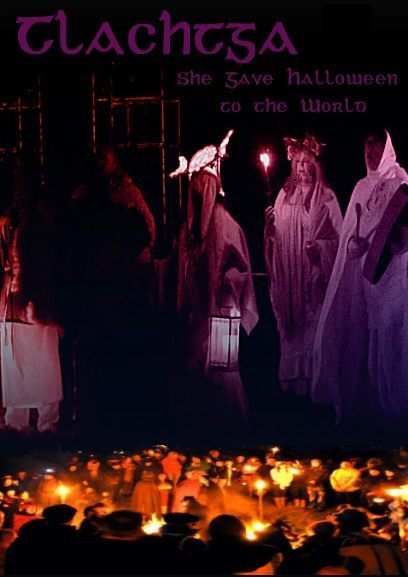
Tlachtga's Hill itself is a small Ring-Fort with man-made circular mounds, relatively modest in size, that recent excavations have revealed may have incredible treasures yet to be realized. The site has long been a gathering place for Pagans and Wiccans, and indeed for those whose belief in a sincere connection with the earth defies such labels. For they know its significance. For this small hill in the middle of the Irish countryside is where the worldwide tradition of Halloween began. Originally known as Samhain, Halloween marks the end of Summer and the harvest. It was a time for great celebrations and feasting in the Pagan world, stretching back to the Bronze Age (approx 3500 B.C. to 1200 B.C.) and possibly even before that era. Geoffrey Keating was a seventeenth century chronicler who wrote about Tlachtga in his much referenced book 'History of Ireland': (it was on this hill that) 'the Fire of Tlachtgha was instituted, at which it was their custom to assemble on the eve of Samhain to offer sacrifice to all the gods... it was of obligation under penalty of fine to quench the fires of Ireland on that night, and the men of Ireland were forbidden to kindle fires except from that fire." and 'the priests, augurs and druids of Ireland [would] assemble upon the eve of All Saints, in order to consume the sacrifices that were offered to their pagan gods'. The hill was one of several important sites in the Kingdom of Midhe (now Meath), others being Tara, Teltown and Uisneach. It became known as the Hill of Ward when it was named for a local landowner who owned it at one time. The Cairns of Loughcrew (over 5000 years old), are visible from the hill. The sacred site at Tara is also within view. As the Christian faith spread throughout Ireland from the fifth century onwards, the process of 'Christianizing' Pagan Gods and Goddesses and their legends and traditions really took hold. Thus the tales of the ancient Goddess Brigid became merged and intertwined with the actual Saint Brigid, who died in the sixth century. Similarly the festival of Samhain was Christianized as 'All Hallows Day'. It is on this night that the veil between the dead and the living might be lifted and when demons might wander the land. Samhain was the festival of the dead, and the beginning of the Celtic new year. It was this Celtic occasion that later became known as Halloween. Dr. Steve Davis, from UCD, has carried out research into the origin of the hill: 'There has been a suggestion that one of the reasons the site is not better known is that it was written out of the (Saint) Patrick story - that it was so infamous that the church did a very good job of trying to erase it from the mythology'. Which brings us to Tlachtga. Tlachtag was a Druidess of considerable power and importance, the daughter of Mug Ruith who lived on Valentia Island in Kerry. He could grow to enormous size while his breath could cause tremendous storms, turning men to stone. He is said to have lived during the reign of nineteen kings, with his lifespan stretching back to the time of Christ on earth. Tlachtga and her father could travel the world on the Rath Ramach, a fabulous spinning wheel of fire that could easily transport them. Mug Ruith sought out knowledge and learning like few before him and it was in this manner that he and Tlachtga travelled to study under Simon Magus (Simon the Sorcerer), who is mentioned in the Bible. Simon Magus looms large in the scope of this tale, and the fact that he has an actual crime named for him (Simony: the buying and selling of Church offices and relics), indicates that this tale will not end well. Simon Magus and Mug Ruith continued with their study of magic and sorcery and sent Tlachtga out into the world to gather as much knowledge as she could. Upon her return they realized that her knowledge far surpassed their own! They were outraged and such was their jealousy that they set the three sons of Simon Magus upon Tlachtga, who defiled her. Of course this was an appalling and dreadful moment for Tlachtga. She returned to Ireland where she gave birth to three sons, Dorb (Doirb), Cuma (Cumma) and Muach. It was on the hill in County Meath that Tlachtga brought her three sons into the world, and it was there that she died, unable to sustain her life in the face of the utter grief and despair she felt at the indignity she had endured. From that time she entered the lexicon of the mythology that is so rich in Ireland and in which there has been a revival of interest and understanding. In recent years a renewal of the annual gathering now attracts hundreds of people to the Hill at Halloween. A walk from Athboy up towards the Hill itself culminates with a celebration, with elaborate ceremonies and an acknowledgement of the cultural gift to Ireland and the world that Tlachtga is. Tlachtga, the Irish Druidess that gave the world Halloween! Further Information: Video of Joe Conlon from Athboy Heritage Forum The Annual Puca Festival Tlachtga: Celtic Fire Festival Book by John Gilroy Read more amazing Stories of Irish Legends and Mythology. |


find out more |

|
Until quite recently it was a little know fact that the creator of perhaps the worlds most famous villain was an Irishman from Clontarf in Dublin. Bram Stoker was born in 1847 to Dubliner Abraham Stoker and Donegal native Charlotte Mathilda Blake Thornley. The third of seven children the young Bram Stoker was bed-ridden for much of his first seven years, a period that gave him much opportunity for reflection and creative thought: 
'I was naturally thoughtful, and the leisure of long illness gave opportunity for many thoughts which were fruitful according to their kind in later years.' He recovered from his ill-health and went on to excel as an athlete at Trinity College from where he graduated with honours in the field of Mathematics in the year 1870. As president of the University Philosophical Society his first paper was on 'Sensationalism in Fiction and Society'. He became the Theatre critic for the Dublin newspaper 'The Evening Mail', which was co-owned by the author of many Gothic tales, Joseph Sheridan Le Fanu, and who was the leading ghost-story writer of the nineteenth century. In 1878 he married Dubliner Florence Balcombe who had previously been courted by Oscar Wilde. Stoker knew Oscar Wilde from his College days and even visited Wilde on the continent after his exile. The family moved to London where Stoker became manager of the Lyceum Theatre, a position he held for 27 years. The Theatre was most associated with Henry Irving who was a famed actor of the classical variety. Stoker was very active in the literary and artistic community in London at the time, meeting with the likes of Sir Arthur Conan Doyle, to whom he was distantly related. But it was to Irving that Stoker was devoted and it is thought that it is upon this man that he based his most famous literary creation - that of Count Dracula. Stoker travelled the world with the now internationally famous acting company and even attended the White House with Irving, meeting Presidents William McKinley and Theodore Roosevelt, such was his employers fame. His experience as a newspaper writer stood him in good stead when he began his work on Dracula. Stoker was already a published writer when he began researching ancient stories about vampires. The style of the book is very much in keeping with his previous experience as a news reporter with diary entries, newspaper clippings and telegrams all adding to a sense of realism. The fact that there were so many contributors within the story added to the sense of reality. Stoker is also said to have been inspired in part by a visit to St. Michan's Church in Dublin, the vaults of which contain many mummified remains. 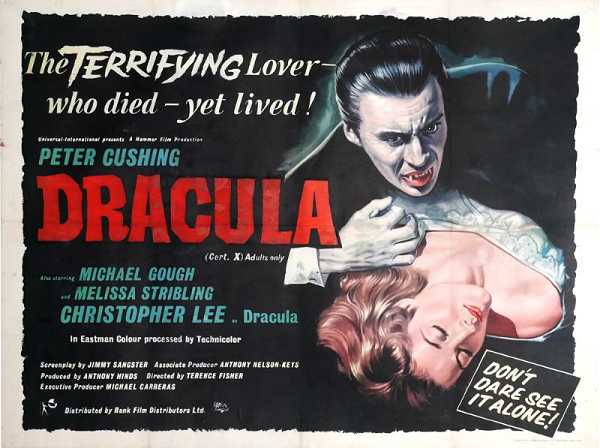
It was thought that the original 541 page Dracula manuscript from 1897 was lost forever but like the subject of the novel it too had to make an epic journey. From Transylvania to Pennsylvania, the US State that is home to many a desperado in hideaways like Allenport, Seneca and Doylestown, the manuscript remained hidden for decades before being amazingly uncovered in a barn there in the early 1980's. The original title of the novel 'The Un-Dead' was clearly marked on it. It was later bought by the co-founder of Microsoft, Paul Allen. Bram Stoker died in London in 1912. While well regarded as a ghost-writer in the Victorian age it was not until the first cinematic production of a vampire in 1922 that his legacy was set forever. Stoker's widow actually sued the German film-makers who produced Nosferatu, the first vampire movie with 'Count Orlock' being substituted for 'Count Dracula' in an attempt to breach the copyright. She won the case in 1925. 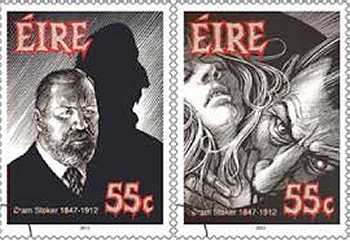
The first authorized version of the story was released in 1931 with Bella Lugois as Count Dracula. Newspapers reported that members of the audiences fainted in shock at the horror on screen! The film became a box office sensation and is regarded as the first full length horror movie. It is estimated that there have been at least 200 movies featuring Dracula while a vampire subculture has blossomed among young people in particular, fuelled by countless television and silver screen productions. It is only in recent years that a fuller appreciation of the work and impact of Bram Stoker has occurred in Ireland and beyond. Mercury Theatre 1938 Radio Recording of Dracula with Orson Welles: http://sounds.mercurytheatre.info/mercury/380711.mp3 Dracula Audio-Book on YouTube: https://www.youtube.com/watch?v=DNlin6nvhPw Dracula Full Text: https://www.ireland-information.com/irishliterature.htm |

|
The Celts celebrated Halloween as Samhain, 'All Hallowtide' - the 'Feast of the Dead', when the dead revisited the mortal world. The celebration marked the end of Summer and the start of the Winter months. 
During the eighth century the Catholic Church designated the first day of November as 'All Saints Day' ('All Hallows') - a day of commemoration for those Saints that did not have a specific day of remembrance. The night before was known as 'All Hallows Eve' which, over time, became known as Halloween. Here are the most notable Irish Halloween Traditions: Colcannon for Dinner: Boiled Potato, Curly Kale (a cabbage) and raw Onions are provided as the traditional Irish Halloween dinner. Clean coins are wrapped in baking paper and placed in the potato for children to find and keep. The Barnbrack Cake: The traditional Halloween cake in Ireland is the barnbrack which is a fruit bread. Each member of the family gets a slice. Great interest is taken in the outcome as there is a piece of rag, a coin and a ring in each cake. If you get the rag then your financial future is doubtful. If you get the coin then you can look forward to a prosperous year. Getting the ring is a sure sign of impending romance or continued happiness. The Ivy Leaf: Each member of the family places a perfect ivy leaf into a cup of water and it is then left undisturbed overnight. If, in the morning, a leaf is still perfect and has not developed any spots then the person who placed the leaf in the cup can be sure of 12 months health until the following Halloween. If not..... The Pumpkin: Carving Pumpkins dates back to the eighteenth century and to an Irish blacksmith named Jack who colluded with the Devil and was denied entry to Heaven. He was condemned to wander the earth but asked the Devil for some light. He was given a burning coal ember which he placed inside a turnip that he had gouged out. 
Thus, the tradition of Jack O'Lanterns was born - the bearer being the wandering blacksmith - a damned soul. Villagers in Ireland hoped that the lantern in their window would keep the wanderer away. When the Irish emigrated in their millions to America there was not a great supply of turnips so pumpkins were used instead. Halloween Costumes: On Halloween night children would dress up in scary costumes and go house to house. 'Help the Halloween Party' and 'Trick or Treat' were the cries to be heard at each door. This tradition of wearing costumes also dates back to Celtic times. On the special night when the living and the dead were at their closest the Celtic Druids would dress up in elaborate costumes to disguise themselves as spirits and devils in case they encountered other devils and spirits during the night. By disguising they hoped that they would be able to avoid being carried away at the end of the night. This explains why witches, goblins and ghosts remain the most popular choices for the costumes. Snap Apple: After the visits to the neighbours the Halloween games begin, the most popular of which is Snap Apple. An apple is suspended from a string and children are blindfolded. The first child to get a decent bite of the apple gets to keep their prize. The same game can be played by placing apples in a basin of water and trying to get a grip on the apple without too much mess! 
The Bonfire: The Halloween bonfire is a tradition to encourage dreams of who your future husband or wife is going to be. The idea was to drop a cutting of your hair into the burning embers and then dream of you future loved one. Halloween was one of the Celt 'fire' celebrations. Blind Date: Blindfolded local girls would go out into the fields and pull up the first cabbage they could find. If their cabbage had a substantial amount of earth attached to the roots then their future loved one would have money. Eating the cabbage would reveal the nature of their future husband - bitter or sweet! Another way of finding your future spouse is to peel an apple in one go. If done successfully the single apple peel could be dropped on the floor to reveal the initials of the future-intended. Anti-Fairy Measures: Fairies and goblins try to collect as many souls as they can at Halloween but if they met a person who threw the dust from under their feet at the Fairy then they would be obliged to release any souls that they held captive. Holy water was sometimes anointed on farm animals to keep them safe during the night. If the animals were showing signs of ill health on All Hallows Eve then they would be spat on to try to ward off any evil spirits. Happy Halloween from Ireland! |

|
Down in Fannet, in times gone by, lived Jamie Freel and his mother. Jamie was the widow's sole support - his strong arm worked for her untiringly, and as each Saturday night came round, he poured his wages into her lap, thanking her dutifully for the halfpence which she returned him for tobacco. 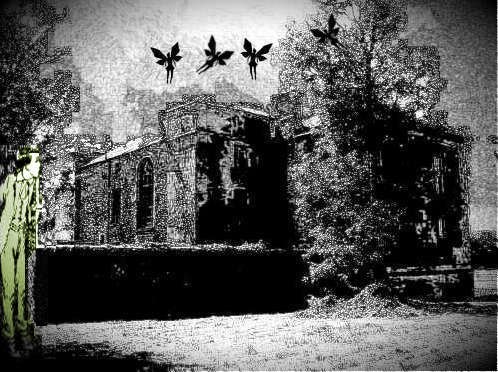 He was extolled by his neighbours as the best son ever known or heard of. But he had neighbours, of whose opinion he was ignorant--neighbours who lived pretty close to him, whom he had never seen, who are, indeed, rarely seen by mortals, except on May eves and Halloweens. An old ruined castle, about a quarter of a mile from his cabin, was said to be the abode of the 'wee folk'. Every Halloween were the ancient windows lighted up, and passers-by saw little figures flitting to and fro inside the building, while they heard the music of pipes and flutes. It was well known that fairy revels took place - but nobody had the courage to intrude on them. Jamie had often watched the little figures from a distance, and listened to the charming music, wondering what the inside of the castle was like - but one Halloween he got up and took his cap, saying to his mother, 'I'm awa' to the castle to seek my fortune.' 'What'' cried she, 'would you venture there? you that's the poor widow's one son' Dinna be sae venturesome an' foolitch, Jamie' They'll kill you, an' then what'll come o' me?' 'Never fear, mother - nae harm 'ill happen me, but I maun gae.' He set out, and as he crossed the potato-field, came in sight of the castle, whose windows were ablaze with light, that seemed to turn the russet leaves, still clinging to the crabtree branches, into gold. Halting in the grove at one side of the ruin, he listened to the elfin revelry, and the laughter and singing made him all the more determined to proceed. Numbers of little people, the largest about the size of a child of five years old, were dancing to the music of flutes and fiddles, while others drank and feasted. 'Welcome, Jamie Freel' welcome, welcome, Jamie'' cried the company, perceiving their visitor. The word 'Welcome' was caught up and repeated by every voice in the castle. Time flew, and Jamie was enjoying himself very much, when his hosts said, 'We're going to ride to Dublin tonight to steal a young lady. Will you come too, Jamie Freel?' 'Aye, that will I'' cried the rash youth, thirsting for adventure. A troop of horses stood at the door. Jamie mounted and his steed rose with him into the air. He was presently flying over his mother's cottage, surrounded by the elfin troop, and on and on they went, over bold mountains, over little hills, over the deep Lough Swilley, over towns and cottages, when people were burning nuts, and eating apples, and keeping merry Halloween. It seemed to Jamie that they flew all round Ireland before they got to Dublin. 'This is Derry,' said the fairies, flying over the cathedral spire - and what was said by one voice was repeated by all the rest, till fifty little voices were crying out, 'Derry' Derry' Derry'' In like manner was Jamie informed as they passed over each town on the route, and at length he heard the silvery voices cry, 'Dublin' Dublin'' It was no mean dwelling that was to be honoured by the fairy visit, but one of the finest houses in Stephen's Green. The troop dismounted near a window, and Jamie saw a beautiful face, on a pillow in a splendid bed. He saw the young lady lifted and carried away, while the stick which was dropped in her place on the bed took her exact form. The lady was placed before one rider and carried a short way, then given another, and the names of the towns were cried out as before. They were approaching home. Jamie heard 'Rathmullan', 'Milford', 'Tamney', and then he knew they were near his own house. 'You've all had your turn at carrying the young lady,' said he. 'Why wouldn't I get her for a wee piece?' 'Ay, Jamie,' replied they, pleasantly, 'you may take your turn at carrying her, to be sure.' Holding his prize very tightly, he dropped down near his mother's door. 'Jamie Freel, Jamie Freel' is that the way you treat us?' cried they, and they too dropped down near the door. Jamie held fast, though he knew not what he was holding, for the little folk turned the lady into all sorts of strange shapes. At one moment she was a black dog, barking and trying to bite - at another, a glowing bar of iron, which yet had no heat - then, again, a sack of wool. But still Jamie held her, and the baffled elves were turning away, when a tiny woman, the smallest of the party, exclaimed, 'Jamie Freel has her awa' frae us, but he sall hae nae gude o' her, for I'll mak' her deaf and dumb,' and she threw something over the young girl. While they rode off disappointed, Jamie lifted the latch and went in. 'Jamie, man'' cried his mother, 'You've been awa' all night - what have they done on you?' 'Naething bad, mother - I ha' the very best of gude luck. Here's a beautiful young lady I ha' brought you for company.' 'Bless us an' save us'' exclaimed the mother, and for some minutes she was so astonished that she could not think of anything else to say. Jamie told his story of the night's adventure, ending by saying, 'Surely you wouldna have allowed me to let her gang with them to be lost forever?' 'But a lady, Jamie' How can a lady eat we'er poor diet, and live in we'er poor way? I ax you that, you foolitch fellow?' 'Weel, mother, sure it's better for her to be here nor over yonder,' and he pointed in the direction of the castle. Meanwhile, the deaf and dumb girl shivered in her light clothing, stepping close to the humble turf fire. 'Poor crathur, she's quare and handsome' Nae wonder they set their hearts on her,' said the old woman, gazing at her guest with pity and admiration. 'We maun dress her first - but what, in the name o' fortune, hae I fit for the likes o' her to wear?' She went to her press in 'the room', and took out her Sunday gown of brown drugget - she then opened a drawer and drew forth a pair of white stockings, a long snowy garment of fine linen, and a cap, her 'dead dress', as she called it. These articles of attire had long been ready for a certain triste ceremony, in which she would some day fill the chief part, and only saw the light occasionally, when they were hung out to air - but she was willing to give even these to the fair trembling visitor, who was turning in dumb sorrow and wonder from her to Jamie, and from Jamie back to her. The poor girl suffered herself to be dressed, and then sat down on a 'creepie' in the chimney comer, and buried her face in her hands. 'What'll we do to keep up a lady like thou?' cried the old woman. 'I'll work for you both, mother,' replied the son. 'An' how could a lady live on we'er poor diet?' she repeated. 'I'll work for her,' was all Jamie's answer. He kept his word. The young lady was very sad for a long time, and tears stole down her checks many an evening while the old woman spun by the fire, and Jamie made salmon nets, an accomplishment lately acquired by him, in hopes of adding to the comfort of his guest. But she was always gentle, and tried to smile when she perceived them looking at her - and by degrees she adapted herself to their ways and mode of life. It was not very long before she began to feed the pig, mash potatoes and meal for the fowls, and knit blue worsted socks. So a year passed, and Halloween came round again. 'Mother,' said Jamie, taking down his cap, 'I'm off to the ould castle to seek my fortune.' 'Are you mad, Jamie?' cried his mother, in terror - 'sure they'll kill you this time for what you done on them last year.'' Jamie made light of her fears and went his way. As he reached the crab-tree grove, he saw bright lights in the castle windows as before, and heard loud talking. Creeping under the window, he heard the wee folk say, 'That was a poor trick Jamie Freel played us this night last year, when he stole the nice young lady from us.' 'Ay,' said the tiny woman, 'an' I punished him for it, for there she sits, a dumb image by his hearth - but he does na' know that three drops out o' this glass I hold in my hand wad gie her her hearing and her speeches back again.' Jamie's heart beat fast as he entered the hall. Again he was greeted by a chorus of welcomes from the company--'Here comes Jamie Freel' welcome, welcome, Jamie'' As soon as the tumult subsided, the little woman said, 'You be to drink our health, Jamie, out o' this glass in my hand.' Jamie snatched the glass from her and darted to the door. He never knew how he reached his cabin, but he arrived there breathless, and sank on a stove by the fire. 'You're kilt surely this time, my poor boy,' said his mother. 'No, indeed, better luck than ever this time'' and he gave the lady three drops of the liquid that still remained at the bottom of the glass, notwithstanding his mad race over the potato-field. The lady began to speak, and her first words were words of thanks to Jamie. The three inmates of the cabin had so much to say to one another, that long after cock-crow, when the fairy music had quite ceased, they were talking round the fire. 'Jamie,' said the lady, 'be pleased to get me paper and pen and ink, that I may write to my father, and tell him what has become of me.' She wrote, but weeks passed, and she received no answer. Again and again she wrote, and still no answer. At length she said, 'You must come with me to Dublin, Jamie, to find my father.' 'I ha' no money to hire a car for you,' he replied, 'an' how can you travel to Dublin on your foot?' But she implored him so much that he consented to set out with her, and walk all the way from Fannet to Dublin. It was not as easy as the fairy journey - but at last they rang the bell at the door of the house in Stephen's Green. 'Tell my father that his daughter is here,' said she to the servant who opened the door. 'The gentleman that lives here has no daughter, my girl. He had one, but she died better nor a year ago.' 'Do you not know me, Sullivan?' 'No, poor girl, I do not.' 'Let me see the gentleman. I only ask to see him.' 'Well, that's not much to ax - we'll see what can be done.' In a few moments the lady's father came to the door. 'Dear father,' said she, 'don't you know me?' 'How dare you call me father?' cried the old gentleman, angrily. 'You are an impostor. I have no daughter.' 'Look in my face, father, and surely you'll remember me.' 'My daughter is dead and buried. She died a long, long time ago.' The old gentleman's voice changed from anger to sorrow. 'You can go,' he concluded. 'Stop, dear father, till you look at this ring on my finger. Look at your name and mine engraved on it.' 'It certainly is my daughter's ring - but I do not know how you came by it I fear in no honest way.' 'Call my mother, she will be sure to know me,' said the poor girl, who, by this time, was crying bitterly. 'My poor wife is beginning to forget her sorrow. She seldom speaks of her daughter now. Why should I renew her grief by reminding her of her loss?' But the young lady persevered, till at last the mother was sent for. 'Mother,' she began, when the old lady came to the door, 'don't you know your daughter?' 'I have no daughter - my daughter died and was buried a long, long time ago.' 'Only look in my face, and surely you'll know me.' The old lady shook her head. 'You have all forgotten me - but look at this mole on my neck. Surely, mother, you know me now?' 'Yes, yes,' said the mother, 'my Gracie had a mole on her neck like that - but then I saw her in her coffin, and saw the lid shut down upon her.' It became Jamie's turn to speak, and he gave the history of the fairy journey, of the theft of the young lady, of the figure he had seen laid in its place, of her life with his mother in Fannet, of last Halloween, and of the three drops that had released her from her enchantment. She took up the story when he paused, and told how kind the mother and son had been to her. The parents could not make enough of Jamie. They treated him with every distinction, and when he expressed his wish to return to Fannet, said they did not know what to, do to show their gratitude. But an awkward complication arose. The daughter would not let him go without her. 'If Jamie goes, I'll go too,' she said. 'He saved me from the fairies, and has worked for me ever since. If it had not been for him, dear father and mother, you would never have seen me again. If he goes, I'll go too.' This being her resolution, the old gentleman said that Jamie should become his son-in-law. The mother was brought from Fannet in a coach and four, and there was a splendid wedding. They all lived together in the grand Dublin house, and Jamie was heir to untold wealth at his father-in-law's death. |

View the Archive of Irish Phrases here: http://www.ireland-information.com/irishphrases.htm |

|
The winner was: mohan8@sbcglobal.net who will receive the following: A Single Family Crest Parchment (usually US$29.99) Send us an email to claim your Parchment, and well done! Remember that all subscribers to this newsletter are automatically entered into the competition every time. I hope that you have enjoyed this issue! 
by Michael Green, Editor, The Information about Ireland Site. https://www.ireland-information.com Contact us (C) Copyright - The Information about Ireland Site, 2023. 17 Páirc Ghrainbhil, Carraig Dubh, Contae Baile Átha Cliath, Ireland Tel: 353 1 2893860 |

|
MARVELOUS GIFTS FOR ANY OCCASION FREE DELIVERY TO YOUR DOOR 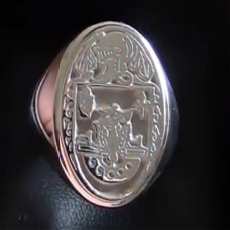
BIG REDUCTIONS! Stunning Family Crest Signet and Seal Rings 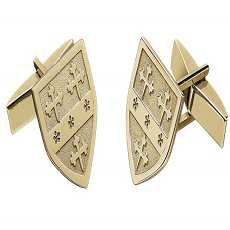
DISCOUNTED FOR A LIMITED TIME Elegant Cufflinks 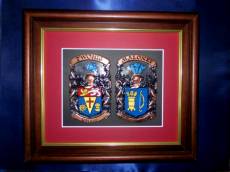
Incredible Family Crest Plaques Made in Ireland 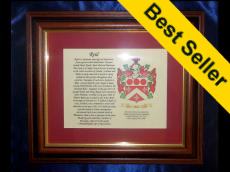
Superior Framed Family Crest Parchments 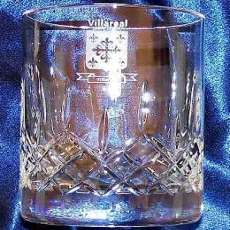
Gorgeous Glistening Galway Crystal 'Your-Name' Old Irish Sign NEW DESIGNS! 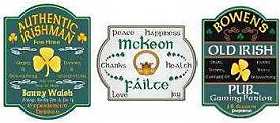
From US$34.99 - Free Delivery 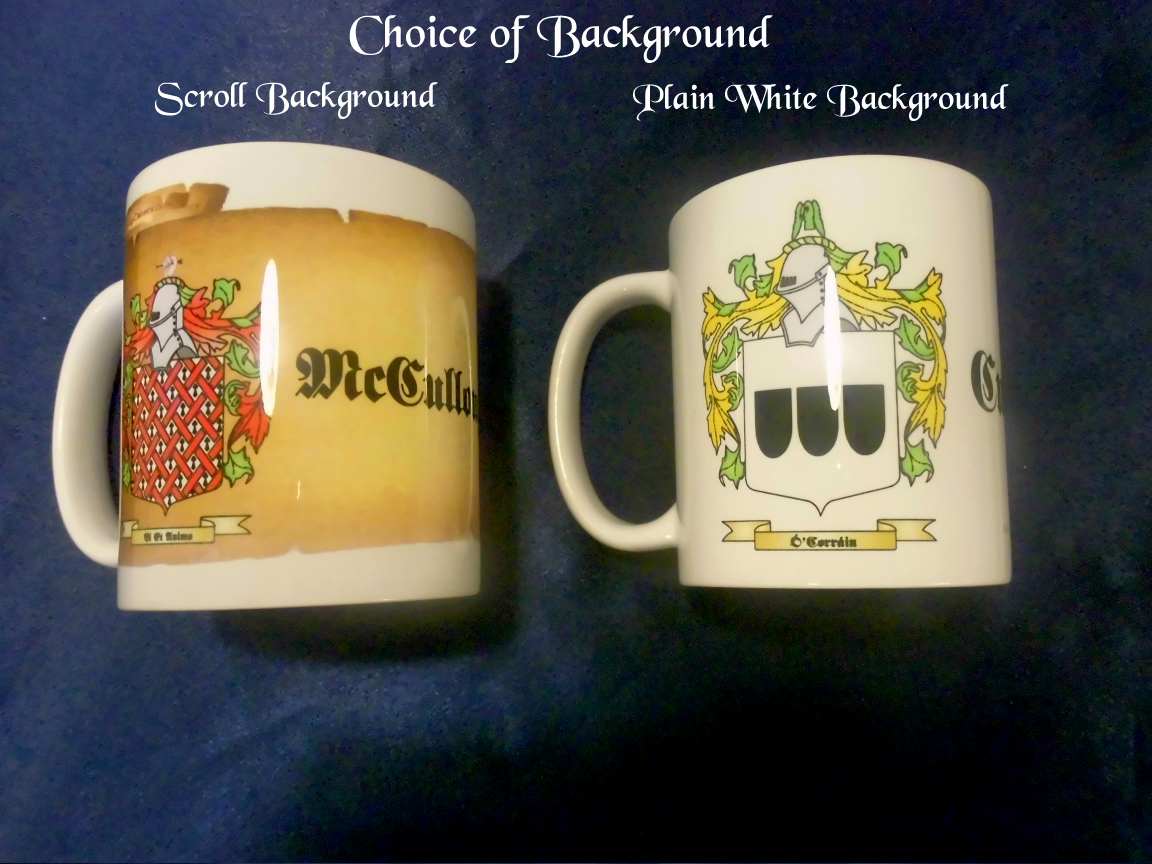
New Designs available on our Coffee Mugs 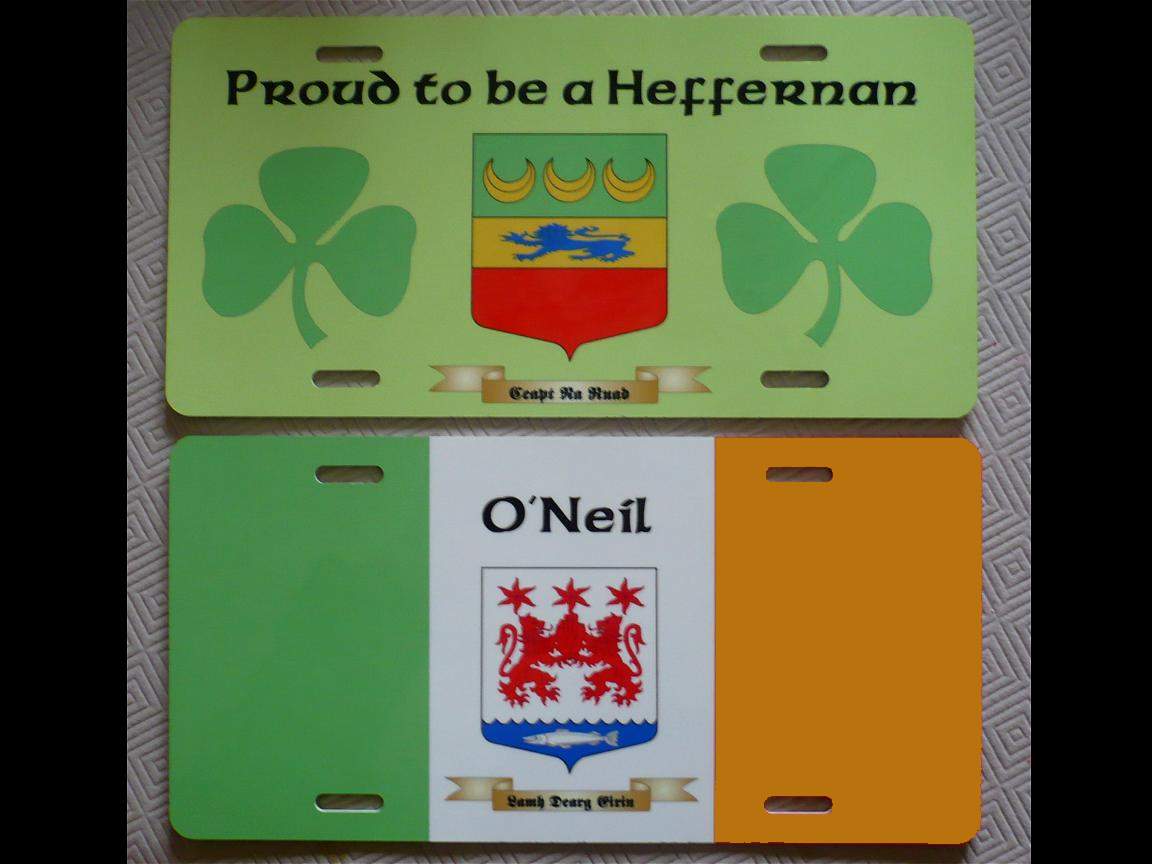
Personalized Licence Plate 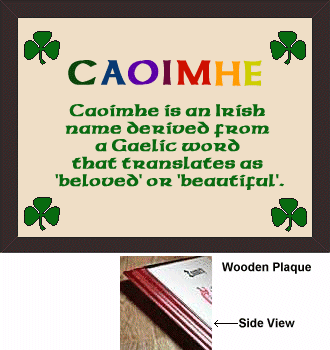
Personalized First Name Plaque. Great for Kids! 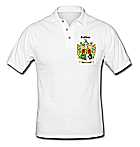
'Your-Name' Polo & Tee Shirts 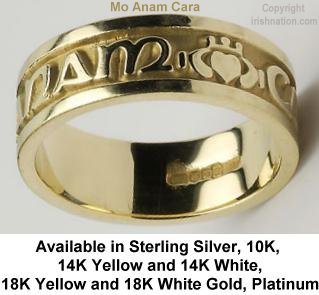
From US$69 Delivered BIG REDUCTIONS! Stunning Engraved Rings from Ireland with Irish Language Phrases. Mo Anam Cara: My Soul Mate Gra Dilseacht Cairdeas: Love, Loyalty, Friendship Gra Go Deo: Love Forever Gra Geal Mo Chroi: Bright Love of my Heart SEE MORE GREAT OFFERS AND DISCOUNTS AT: IRISHNATION.COM FREE DELIVERY FOR A LIMITED TIME! |
